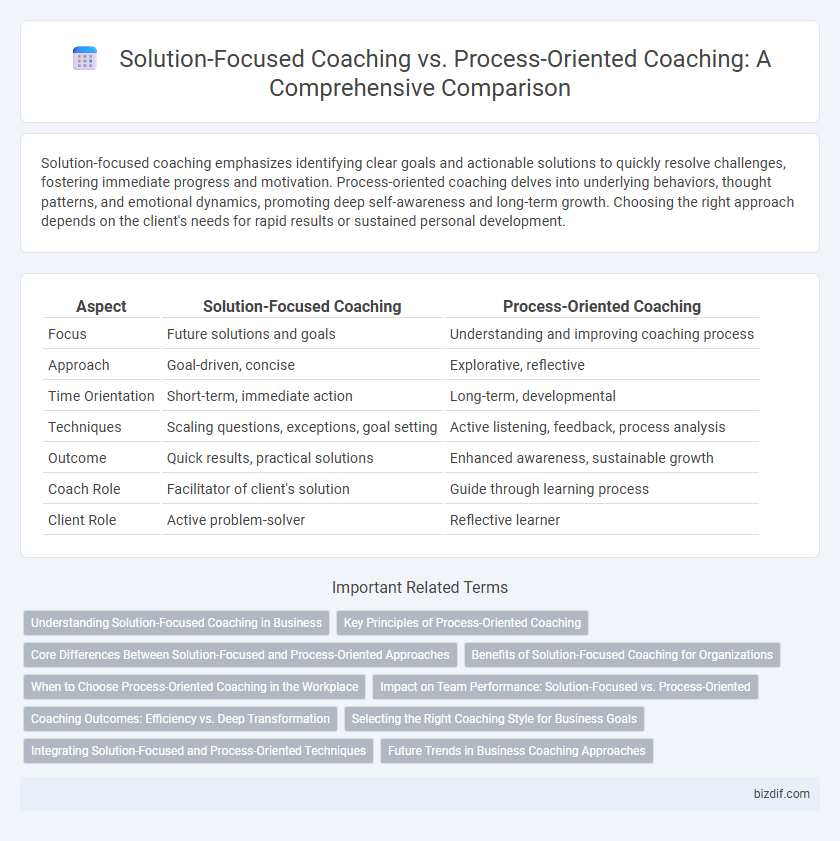Solution-focused coaching emphasizes identifying clear goals and actionable solutions to quickly resolve challenges, fostering immediate progress and motivation. Process-oriented coaching delves into underlying behaviors, thought patterns, and emotional dynamics, promoting deep self-awareness and long-term growth. Choosing the right approach depends on the client's needs for rapid results or sustained personal development.
Table of Comparison
| Aspect | Solution-Focused Coaching | Process-Oriented Coaching |
|---|---|---|
| Focus | Future solutions and goals | Understanding and improving coaching process |
| Approach | Goal-driven, concise | Explorative, reflective |
| Time Orientation | Short-term, immediate action | Long-term, developmental |
| Techniques | Scaling questions, exceptions, goal setting | Active listening, feedback, process analysis |
| Outcome | Quick results, practical solutions | Enhanced awareness, sustainable growth |
| Coach Role | Facilitator of client's solution | Guide through learning process |
| Client Role | Active problem-solver | Reflective learner |
Understanding Solution-Focused Coaching in Business
Solution-focused coaching in business emphasizes identifying actionable goals and leveraging existing strengths to drive rapid progress, contrasting with process-oriented coaching that concentrates on analyzing underlying problems and detailed steps. This approach increases efficiency by concentrating on desired outcomes rather than problem origins, fostering immediate improvement and client empowerment. Key techniques include goal-setting, scaling questions, and envisioning future success to create practical and sustainable business solutions.
Key Principles of Process-Oriented Coaching
Process-oriented coaching emphasizes understanding the client's inner experiences and emotional patterns, fostering deep self-awareness and long-term personal growth. Key principles include active listening, exploring subconscious motivations, and facilitating emotional regulation to unlock transformative insights. This approach values the process of change over immediate solutions, enabling sustainable development through reflective dialogue and empathetic connection.
Core Differences Between Solution-Focused and Process-Oriented Approaches
Solution-focused coaching emphasizes identifying and leveraging clients' strengths to achieve specific goals rapidly by concentrating on solutions rather than problems. In contrast, process-oriented coaching delves deeply into clients' thoughts, emotions, and behaviors to foster awareness and long-term personal development through reflective exploration. The core difference lies in solution-focused coaching's goal-directed, brief interventions versus process-oriented coaching's emphasis on in-depth understanding and transformational growth.
Benefits of Solution-Focused Coaching for Organizations
Solution-focused coaching enhances organizational performance by rapidly identifying and leveraging existing strengths to overcome challenges, leading to increased employee engagement and productivity. This coaching method fosters a positive work environment by promoting actionable goals and encouraging a forward-thinking mindset. Organizations benefit from improved problem-solving efficiency and sustained motivation, driving long-term success and adaptability.
When to Choose Process-Oriented Coaching in the Workplace
Process-oriented coaching proves essential in the workplace when employees face complex challenges requiring deep reflection and skill development over time. This method emphasizes understanding underlying behaviors, thought patterns, and emotional responses, fostering long-term growth and sustainable change. It is particularly effective during organizational transitions, leadership development, and when addressing persistent performance barriers.
Impact on Team Performance: Solution-Focused vs. Process-Oriented
Solution-focused coaching drives immediate team performance improvements by emphasizing goal achievement and actionable strategies, fostering motivation and quick wins. Process-oriented coaching enhances long-term team development through continuous reflection and skill-building, promoting resilience and adaptability. Teams guided by solution-focused approaches often experience accelerated results, while process-oriented methods build sustainable performance foundations.
Coaching Outcomes: Efficiency vs. Deep Transformation
Solution-focused coaching prioritizes efficiency by targeting specific goals and actionable outcomes, accelerating client progress through concise, goal-driven sessions. Process-oriented coaching emphasizes deep transformation through reflective exploration of underlying beliefs and patterns, facilitating long-term personal growth and behavioral change. Choosing between these approaches depends on whether immediate results or comprehensive self-awareness aligns better with the client's needs and objectives.
Selecting the Right Coaching Style for Business Goals
Solution-focused coaching targets specific business outcomes by emphasizing actionable strategies and rapid problem resolution, making it ideal for goal-driven environments. Process-oriented coaching prioritizes deep exploration of organizational dynamics and personal development, fostering sustainable growth and long-term change. Selecting the right coaching style depends on the urgency of business objectives and the need for transformative versus tactical interventions.
Integrating Solution-Focused and Process-Oriented Techniques
Integrating solution-focused coaching and process-oriented coaching techniques combines goal-directed strategies with in-depth exploration of client experiences, fostering both actionable outcomes and personal growth. This hybrid approach enhances client engagement by aligning concrete solutions with the emotional and cognitive processes driving behavior change. Coaches leveraging both methods create a dynamic framework that adapts to diverse client needs, promoting sustainable transformation and resilience.
Future Trends in Business Coaching Approaches
Solution-focused coaching emphasizes actionable strategies and measurable outcomes, driving rapid problem resolution and client empowerment. Process-oriented coaching delves into ongoing self-awareness and emotional intelligence, fostering sustainable personal and professional growth. Future trends in business coaching increasingly integrate AI-driven analytics and hybrid models, combining these approaches to tailor personalized development and optimize performance metrics.
Solution-focused coaching vs process-oriented coaching Infographic

 bizdif.com
bizdif.com